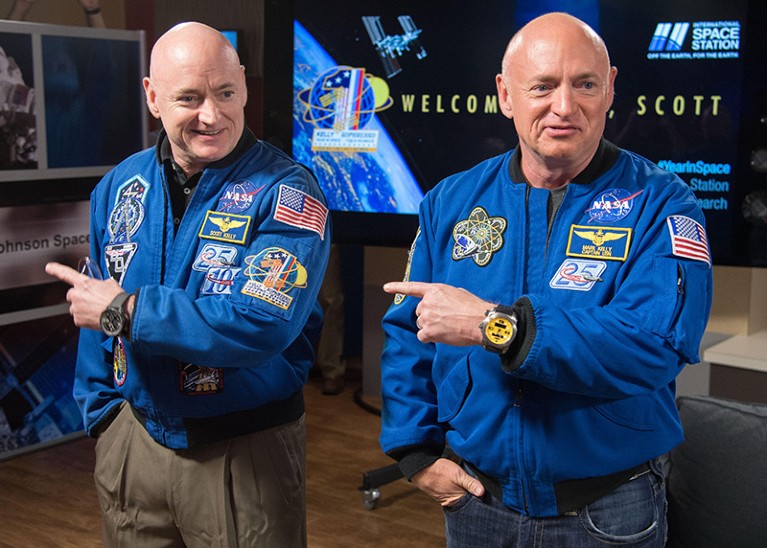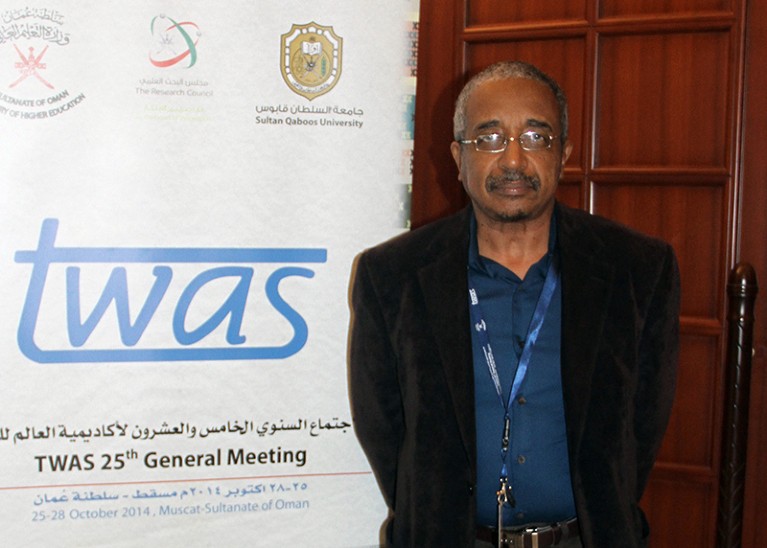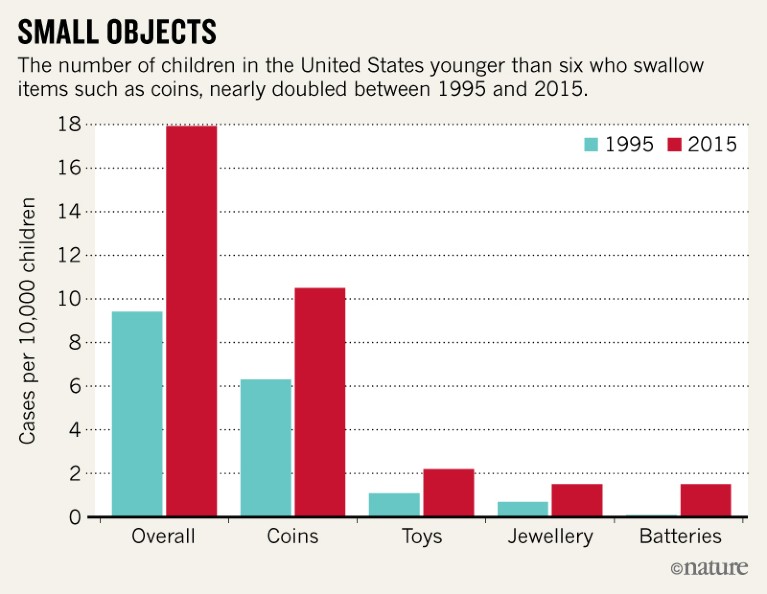RESEARCH
Astronaut twins back to being identical NASA’s identical-twin astronauts, Scott and Mark Kelly, are back to being nearly identical. That’s the verdict of a study, published in Science on 11 April, that tracked how Scott’s body changed during a nearly year-long space flight in 2015–16, while Mark stayed on Earth. For 25 months, researchers subjected the twins to a battery of tests, including taking samples of blood, urine and faeces before, during and after the space flight. They found that many of the genetic, biochemical and other changes that had affected Scott — such as alterations in gene markers linked to stress — disappeared once he returned from space. Because the study involved just two people, the findings are probably not broadly applicable to other astronauts. But NASA hopes to use the information to guide future studies of astronaut health.

NASA astronauts Scott (left) and Mark Kelly took part in a 25-month twin study on the effects of spaceflight.Credit: NASA/Alamy
EVENTS
Nepal tornado A deadly storm that tore through Nepal at the end of March was the country’s first recorded tornado. A team of Nepalese researchers identified the extremely rare event in the country’s southeast without the aid of typical tornado-detecting instruments, instead relying on satellite images, analysis of social-media posts and a visit to the affected area. The government says 28 people died and more than 1,100 were injured in the storm on 31 March, which also damaged about 2,600 buildings and a national park that is listed as a World Heritage Site. Tornadoes are typically formed by thunderstorms known as supercells, which are not usually found in Nepal, says Leigh Orf, an atmospheric scientist at the University of Wisconsin–Madison. Nepal lacks the scientific infrastructure to identify a tornado easily, says Archana Shrestha, a meteorologist at the Department of Hydrology and Meteorology in Kathmandu.
JASON turmoil The US Department of Defense has ended a long-standing relationship with JASON, an independent group that has provided the federal government with unvarnished technical advice on nuclear weapons and other issues since the height of the cold war. The department abruptly announced that it would not renew its five-year contract with the group in a 28 March letter to the MITRE Corporation, a non-profit consultancy in McLean, Virginia, that manages the contract. News of the decision came to light on 9 April during a hearing organized by the House of Representatives’ Armed Services Committee. The decision effectively terminates JASON’s ongoing projects with other government agencies, such as the Department of Energy, because all of JASON’s work for the government is funnelled through its contract with the defence department. The group typically produces 12–15 studies per year for the US government, at a cost of between US$7 million and $8 million.
POLITICS
Brexit delayed The prospect of a damaging no-deal Brexit was put on hold on 11 April after the United Kingdom and the European Union agreed to extend the country’s membership of the bloc until 31 October 2019. The terms of the extension allow the United Kingdom to leave the EU any time before that date, should the government succeed in getting parliamentary approval for Prime Minister Theresa May’s divisive Brexit deal. The deal was agreed with EU officials last November, but has been voted down by Parliament on three occasions. The government is now in talks with leaders of the opposition Labour Party to break the political deadlock. Many people — including politicians and scientists — fear that a no-deal Brexit would cause chaos because it would disrupt the flow of goods, including laboratory supplies, that come to Britain through the EU. It would also instantly affect EU research-funding streams and data-sharing agreements.
PEOPLE
Harassment case Boston University in Massachusetts has fired David Marchant, a geologist who is alleged to have harassed women during field expeditions to Antarctica in the late 1990s. On 12 April, the university’s board of trustees upheld a recommendation from president Robert Brown to terminate Marchant’s employment. A university investigation had previously found that Marchant had violated university policies prohibiting sexual harassment. Through his lawyer, Marchant denied the allegations and said that he “will pursue his rights in court”.
Geneticist freed Muntaser Ibrahim, a prominent Sudanese geneticist who had been in jail in Khartoum since February, was freed on 11 April amid nationwide protests (pictured) that toppled Sudan’s long-standing dictator, Omar al-Bashir. Ibrahim was detained alongside thousands of other civilians, including lawyers, doctors, journalists and students, after taking part in protests against al-Bashir that have rocked the country since last December, sparked by rising bread and fuel prices. Ibrahim, of the Institute of Endemic Diseases in Khartoum, studies the genetics of diseases affecting Sudan, such as the parasitic illness leishmaniasis. He is a founding member of the African Society of Human Genetics. Al-Bashir came to power in a coup in 1989. He was toppled by a military-led uprising last week; the army has installed a temporary council to run the country, but protests continue to call for immediate civilian rule.

Geneticist Muntaser Ibrahim has been freed from jail amid political changes in Sudan.Credit: The World Academy of Sciences (TWAS)
PUBLISHING
Indian repository Researchers in India will soon have their own preprint repository, where they can post manuscripts from any discipline. IndiaRxiv joins a growing number of preprint servers hosting research from a particular region, including Indonesia’s INA-Rxiv and Africa’s AfricArxiv. IndiaRxiv will be accepting submissions from the end of April. These can include original research, conference proceedings and data sets. The repository will host submissions in English and any Indian language. “The success of the Indonesian and African preprint repositories motivated us to create another one for the global south,” says Sridhar Gutam, a plant scientist at the Indian Agricultural Research Institute in New Delhi. Gutam founded the advocacy group Open Access India, which is leading the IndiaRxiv initiative. He hopes that the platform will improve the quality of Indian science.
PUBLIC HEALTH
Ebola decision Despite a spike in Ebola cases in the Democratic Republic of the Congo (DRC) over the past few weeks, the World Health Organization (WHO) says that the outbreak there is not a public-health emergency of international concern. The WHO decided against declaring the emergency on 12 April because the outbreak is limited to two provinces in the country’s northeast. The area is a conflict zone, home to more than 20 armed groups, as well as opponents of the DRC’s ruling political party. Political tensions are complicating the organization’s attempts to curb the outbreak, said Tedros Ghebreyesus, director-general of the WHO in Geneva, Switzerland, at a press conference on 12 April. As of 13 April, there were 1,251 cases of Ebola in the DRC and 803 people have died, according to the WHO.
Malaria vaccine A malaria vaccine capable of giving people 100% protection against the disease will be tested in a large clinical trial for the first time. The trial will begin in 2020 on Bioko, an island of Equatorial Guinea, and will involve 2,100 people, including children. The vaccine, called PfSPZ, is injected intravenously and works by eliciting an immune response against the malaria parasite Plasmodium falciparum. It is made from sporozoites, which are a stage in the parasite’s life cycle that is transmitted by mosquitoes. Vaccine-maker Sanaria in Rockville, Maryland, produces the sporozoites from farmed mosquitoes. PfSPZ is the only malaria vaccine to have achieved 100% protection in laboratory trials with healthy volunteers. Equatorial Guinea’s government and private energy companies are sponsoring the trial.
TREND WATCH
The number of children in the United States who swallowed coins, toys and other small objects nearly doubled between 1995 and 2015, according to an analysis. Some of these objects can cause serious harm when ingested, and possibly even death. In 1995, more than an estimated 22,000 children under the age of six visited emergency departments across the country after swallowing items such as marbles, buttons or rings. By 2015, the number had risen to about 43,000, an average annual increase of 4.4% over the two decades. The researchers published their findings on 12 April (D. Orsagh-Yentis et al. Pediatrics 143, e20181988; 2019). Of all the objects swallowed, coins were by far the most common, followed by toys, jewellery and batteries. Between 1995 and 2015, there was a 60-fold increase in the proportion of children ingesting batteries, from 0.14% to 8.4%. The most common type of battery that children swallowed was button batteries, which are used in devices including watches, remote controls and electronic toys. These small, flat objects can damage or even puncture the walls of the oesophagus if they become stuck.

Sources:: US Consumer Product Safety Commission, National Electronic Injury Surveillance System



